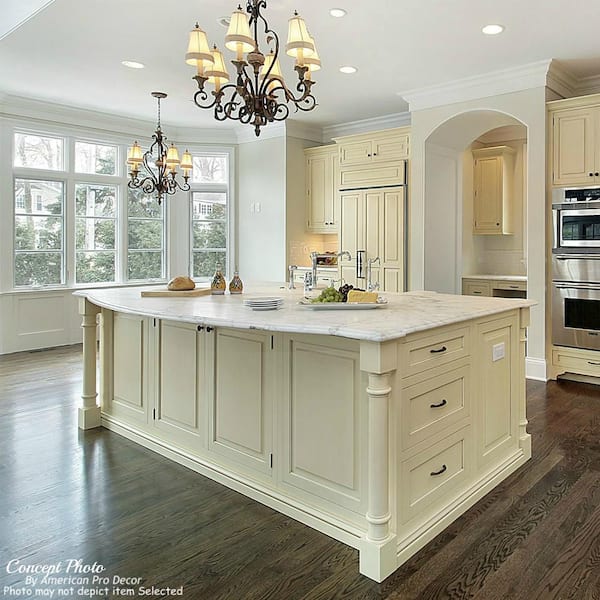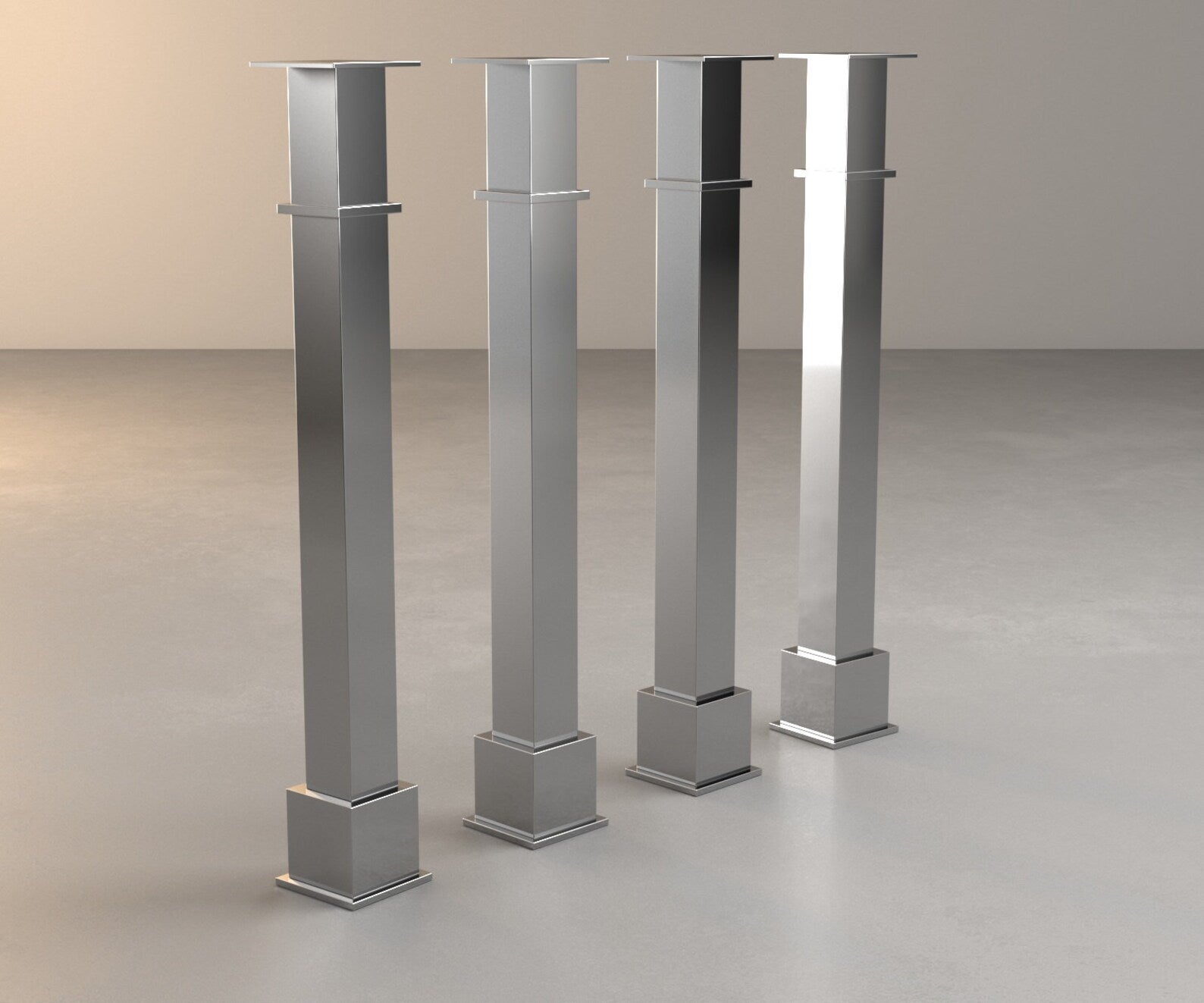Necessary Aspects to Think About When Choosing Legs For Kitchen Island
Selecting the suitable legs for a kitchen area island involves a mindful evaluation of several factors that can significantly affect both capability and aesthetic appeal. Amongst these, the option of material plays a crucial function in guaranteeing resilience, while the design has to enhance the existing design. Moreover, considerations such as elevation and weight support are important for security and convenience. As we explore these aspects, it becomes clear that each choice can have significant effects for the general kitchen experience. What nuances should be considered in each of these classifications to attain the suitable balance?
Material Options
When choosing legs for a cooking area island, understanding the different product alternatives is important for attaining both visual appeal and structural stability (Legs For Kitchen Island). The selection of product considerably influences not just the durability of the island however likewise its total layout and functionality
Wood is a prominent option, using heat and versatility. Solid hardwoods, such as oak or maple, supply stamina and can be tarnished or repainted to match the cooking area decor. Metal legs, typically made from stainless steel or wrought iron, add a industrial and contemporary feel while making certain sturdiness and security. These products are resistant to wear and can sustain considerable weight, making them optimal for larger islands.
One more choice is engineered products, like MDF or plywood, which can be extra cost-efficient while still using a series of surfaces. However, they may not provide the very same degree of stability as solid timber or metal. Products such as acrylic or glass can produce a contemporary appearance, though they may call for extra support to make certain stability.
Ultimately, the choice of product for kitchen area island legs ought to straighten with the preferred functionality and the general theme of the cooking area.
Design And Style

When taking into consideration design, the form and coating of the legs are critical. Conical legs can provide a sense of lightness and beauty, while thicker, much more robust legs can convey strength and stability. Additionally, the finish-- be it repainted, stained, or natural-- should enhance the kitchen cabinetry and kitchen counter materials to produce a unified look.
Moreover, the design of the legs can additionally reflect individual preference. Custom-made or ornamental legs, such as those featuring intricate makings or special geometric shapes, can serve as focal points, adding personality and character to the kitchen area. Ultimately, the ideal selection will not just boost performance but additionally raise the aesthetic allure, making the cooking area island a standout function of the home.
Height Factors To Consider
Picking the proper height for cooking area island legs is critical, as it straight impacts both capability and comfort. The standard elevation for a kitchen island commonly varies from 36 to 42 inches, straightening with usual counter top heights. A 36-inch elevation is excellent for food prep work and cooking, permitting for comfy use cooking area devices and tools. On the other hand, an elevation of 42 inches is frequently preferred for islands meant for bar seating, accommodating taller feceses and offering a casual dining experience.

It is also necessary to make up individuals' heights and choices. Personalizing the height can make sure a comfortable experience for all member of the family, making the kitchen island an extra useful and satisfying space.
Weight Support
Ensuring ample weight support for cooking area island legs is crucial company website for both safety and performance. The kitchen island commonly serves numerous purposes, consisting of food preparation, eating, and additional storage, demanding a robust assistance structure. When go to website picking legs, it is important to take into consideration the general weight ability required based upon the island's planned usage and the materials that will certainly be positioned on it.
The option of product for the legs plays a considerable duty in their weight-bearing capabilities. Strong timber, metal, and durable compounds generally offer premium strength compared to lighter products. Additionally, the design of the legs-- whether they are directly, tapered, or have a pedestal kind-- can affect their ability to distribute weight successfully throughout the structure.
Furthermore, the leg positioning need to be strategically prepared to improve security. Legs placed at the edges or with a wider base can better support much heavier tons. Constantly consult the producer's specs relating to lots restrictions to make certain that the legs can sustain the intended weight without compromising safety. In recap, choosing kitchen area island legs with appropriate weight support is important for producing a functional and secure culinary room.
Setup and Maintenance
Proper installment and maintenance of cooking area island legs are vital for making certain durability and security. This typically involves protecting the legs to the island base using proper fasteners, guaranteeing that the legs are degree and lined up.
As soon as set up, normal maintenance is needed to preserve the stability and look of the legs - Legs For Kitchen Island. For wooden legs, regular cleansing with a damp fabric and application of ideal wood gloss can protect against wetness damages and maintain their surface. Steel legs might need a mild cleaning service to get rid of grease and gunk, complied with by a completely dry cloth to stop corrosion formation
Furthermore, evaluate the legs routinely for indications of wear or damage, such as fractures or loosened joints. Tightening up screws or screws as required can additionally lengthen the lifespan check my reference of the legs. By adhering to these installation and maintenance practices, property owners can make sure that their kitchen area island stays strong and aesthetically appealing for many years to find.
Final Thought

Aesthetic coherence is vital in picking the style and design of legs for a kitchen area island, as these aspects substantially affect the overall ambiance of the area. Conical legs can give a feeling of agility and elegance, while thicker, much more robust legs can communicate stamina and stability.Selecting the proper elevation for cooking area island legs is critical, as it directly impacts both functionality and comfort. In summary, selecting kitchen island legs with adequate weight support is important for creating a functional and safe cooking room.
In conclusion, picking legs for a cooking area island demands mindful factor to consider of different aspects, including material options, design, elevation, weight support, and installation.
Comments on “Check Out Modern and Classic Styles in Legs For Kitchen Island Tasks”